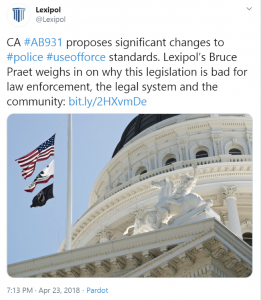There is a great deal of discretion involved with the practice of policing — a fact that has been made more painfully clear than ever over these past few years, which continue to be filled with controversial shootings by members of law enforcement. Yet, despite historic protests, a more educated public, some local police reforms, and a push for better officer training, the shootings continue.
Following the killing of George Floyd in May 2020, along with a flood of other disturbing fatal shootings, justice advocates and legislators have focused with renewed intensity on the need for law enforcement agencies to rethink their use of force policies.
Yet, although there are almost 18,000 law enforcement agencies across the U.S., there is still no national standard governing those agencies use of force.
This is a problem.
This lack of revised requirements means that many departments are using rules that were written decades ago, which may be far from what are considered to be best practices in today’s world, and that the U.S Justice Department, and other knowledgeable justice reformers hope to put into practice .
The Justice in Policing Act, passed in the House of Representatives in June 2020 (and sitting in the U.S. Senate), if passed, would eliminate federal funding for jurisdictions that did not prohibit the use of chokeholds, and would tie funding to use-of-force reform in general.
The American Law Institute has proposed creating a national use-of-force standard that would make clear, among other things, “that lethal force should be a last resort.”
In April of this year, the LA Times reported on the “broad investigations” the U.S. Justice Department had just launched into two major city polices, as a part of Biden administration’s push to fix problem fraught police agencies.
“In both instances,” wrote the LAT, “the Justice Department will focus intense attention on use-of-force policies, a critical issue in any police reform effort.”
So, yes, there is certainly some progress in this movement toward reform. But there is also a lot of resistance.
Notably, according to a just released and excellent reportby UCLA law professors Ingrid V. Eagly and Joanna C. Schwartz, one of the largest obstacles to widespread law enforcement reform is a private company that most Americans have never heard of.
(By the way, in addition to being professors at at UCLA School of Law, Joanna Schwartz is one of the nation’s experts on police misconduct litigation, and Ingrid Eagly is the faculty director of the law school’s Criminal Justice Program, and an expert in the interwoven worlds of criminalization of migration, police policymaking, and U.S. immigration courts.)
The company, Lexipol LLC, the two authors write, “has become one of the most powerful voices pushing against reform,” particularly when it comes to “use-of-force standards.”
Founded in 2003, Lexipol crafts police policies and trainings for a huge portion of law enforcement agencies across the U.S. As a consequence, Lexipol’s perspectives on police reform cannot help but have a significant influence on the policies embraced by those same agencies, large and small.
All of this, Schwartz and Eagly say, should alarm us.
“Lexipol’s dominant role in police policymaking should be cause for real concern,” the authors write. Lexipol, they say, “has taken a retrograde position in its use-of-force policies, advocated against proposed use-of-force reforms, and endeavored to undermine reforms that are enacted.
For these reasons, Lexipol is not a “reliable partner” for federal, state, and local governments, and for community members and other advocates interested in advancing police reform.
Lexipol in California
When it comes to California laws and law enforcement, one instructive example of Lexipol’s engagement with policy making and reform was their response to AB 392. This was a bill that was passed through the state legislature in August 2019, it’s purpose to reset the state’s threshold for police to justifiably use deadly force as only when it is “necessary,” a change from the previous wording permitting deadly force when it is “reasonable.”
Lexipol, it turns out, was one of the lobbying entities that was very active in its opposition to the bill as it made its way through the legislature.
Then, after AB 392’s passage, according to the new report, Lexipol’s leadership claimed that they were “instrumental in efforts to add language to the bill that made it less restrictive.”
(The company was also strongly and vocally against AB 392’s predecessor, AB931, as the company’s tweet below demonstrates.)
The bill’s advocates in the state legislature, plus California’s various justice advocacy groups, celebrated the passage of AB392 as putting important limits on police powers.
However, according to the new report, now that the bill is law, Lexipol has advised its law enforcement agency members that nothing has changed in California and that police and sheriff’s departments can continue to rely on the what is known as the Graham v. Connor standard — as opposed to the standard set by the new law.
Graham v. Connor, for those unfamiliar, is 1989 ruling by the U.S. Supreme Court, which holds that “claims of excessive force used by government officials are properly analyzed under the Fourth Amendment’s ‘objective reasonableness’ standard,” not on the more generalized “excessive force” standard.
The new report’s authors, who have written previously about the effect of the three-decade-old decision, note that “Graham has been widely criticized for not offering sufficient guidance to officers and creating no clear limits on the extent of officers’ power.”
To put it another way, using Graham as one’s use-of-force guide, throws open the door for the overuse of the “I feared for my life” defense for questionable shootings, among other problems.
Promoting “warrior” policing?
The report’s authors make the point that Lexipol’s efforts against reforms of use-of-force policy are critically important in this moment, when members of those communities whose residents are too often the most affected by uses of force by police, including deadly force, and are calling urgently for changes in policy.
“Lexipol’s rejection of most use-of-force policy reforms means that its 3,500 subscribers, almost one-fifth of law enforcement agencies across the country, will be less likely to adopt these reforms,” the law professor/authors write. “Lexipol’s anti-reform message, which is communicated on its website, blogs, and promotional arms like Police1, also serves as ammunition for state and local governments across the country to be reticent to adopt more restrictive policies.”
In other words, Lexipol, and its side publications, are still pushing the police-as-warriors perspective, rather than the newer view of police as guardians POV.
And a significant percentage of the nation’s law enforcement agencies are paying Lexipol well for that perspective.
In a popular webinar available to subscribers, Bruce Praet, co-founder of Lexipol, underscores his endorsement of use-of-force policies based on the least nuanced view of Graham, the authors of the new report point out.
In the webinar, Praet, who does not appear to be all that big a fan of deescalation training either, tells his viewers that nothing should matter in evaluating use of force, other than if the force was objectively reasonable under Graham.
“I don’t care if you run him over with your police car. I don’t care if you smack him with your baton, choke him out, tase him, bite him, shoot him.” He is only interested in “one question,” Praet says. “Was it ‘objectively reasonable’ under the totality of the circumstances presented at the time?”
More recently, the report’s authors note that Lexipol in general has come out as a strong opponent to an emerging consensus on the need to require better training in de-escalation techniques.
Yet, in a widely circulated Lexipol white paper on use of force, the company claims it is a “myth” that “use of force policies should require the use of de-escalation tactics.”
Certainly, Lexipol has other instructional papers, videos, and the like, that are arguably more reform minded.
For example, there is this July 21, 2021 article which offers useful strategies to help officers and deputies to “better connect and engage with the communities you serve.”
Yet, the bottom line, according to Schwartz and Eagly, is that Lexipol is a powerful obstacle standing in the way of some of the most essential changes police agencies need to make.
“America is in the midst of a critically important moment in police reform,” they write. “National and local attention is fixed on how to reduce the number of people killed and injured by the police.”
One approach to reform, “which evidence has shown does reduce police killings,” is to limit officers’ and deputies’ power to use force.
According to Eagly and Schwartz, Lexipol is a major force in blocking this path to better policing “by promoting policies and trainings that do not adopt use-of-force policy reforms,” by advocating against these reforms, “and by limiting their impact when adopted.”
Local governments and police insurers have long viewed Lexipol as an essential and well-respected partner in keeping policies lawful and up-to-date.
And there are many things that Lexipol does well. The company even has a smart instructional article and accompanying video about how fire fighters can combat the knee pain that sometimes can plague their profession.
But according to the legal expert authors of this new report, when it comes to certain law enforcement reforms that have now become essential to the health and well being of communities across the nation, it’s time “to take a closer look” at Lexipol’s oversized influence.
Photo at time via Lexipol.





[…] How A Private Company Has Become One Of The Most Powerful Voices Pushing Against Police Reform, Espe… Celeste Fremon, WitnessLA […]